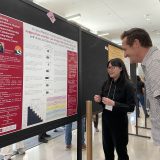Schmid College Wins Major Grant to Study Climate Change Impact on California Agriculture The $848,000 three-year grant will support advanced computational modeling to project the effects of climate change
May 26, 2011
The Schmid College of Science at Chapman University has been awarded a major grant to study the agricultural impact of climate change in California, Arizona and New Mexico.
Funded by the U.S. Department of Agriculture (USDA), the $848,000 three-year grant will support advanced computational modeling to project the effects of climate change, allowing scientists and agricultural planners to see what the future might look like in the American Southwest. The research is vital to the region’s agricultural industry, says the project’s principal investigator Menas Kafatos, Ph.D., dean of Chapman’s Schmid College of Science, Fletcher Jones Endowed Professor in Computational Physics and vice chancellor for special projects.
“Some of the most profound impacts of climate change are the regional effects on natural and managed ecosystems, namely agriculture, and on the services such as food, water, fiber and energy that we all derive from them,” says Dr. Kafatos. “To understand, simulate and anticipate the effects of climate change in the coming decades, it is necessary to couple regional processes with global climate through accurate regional modeling that captures climate impacts on regional ecosystems. The central goal of this investigation is to utilize regional climate models and methodologies to assess the potential impacts of climate variability and change on ecosystems and agriculture in California, Arizona and New Mexico.”
The research is part of the Earth System Modeling Program (EaSM), a joint initiative between the National Science Foundation (NSF), the Department of Energy (DOE) and the U.S. Department of Agriculture (USDA). The $848,000 competitively won program is being funded by the National Institute of Food and Agriculture (NIFA) of the USDA over three years. It will provide multi-model simulations of the impact of climate change on agriculture and natural ecosystems in the southwestern United States.
“To understand, simulate and anticipate the effects of climate change in the coming decades, it is necessary to couple regional processes with global climate through accurate regional modeling that captures climate impacts on regional ecosystems. The central goal of this investigation is to utilize regional climate models and methodologies to assess the potential impacts of climate variability and change on ecosystems and agriculture in California, Arizona and New Mexico,” says Dr. Kafatos.
Other Chapman faculty and technical staff on the project include Craig Tremback, Ph.D.; Anup Prasad, Ph.D.; Hesham El-Askary, Ph.D.; Nikos Hatzopoulos, computer engineer, and student David Stack.
The project, instead of focusing on global issues where a lot of uncertainty exists, will study the real-life impacts on California, issues which affect the water availability for agriculture, how agricultural plants such as grapes, fruits, etc., as well as dairy, will be affected by regional processes. As such, the research will utilize regional climate models to assess the potential impacts of future changes in the Southwest, concentrating on crops and trees and shrubs.
Schmid College’s Computational Forecast Laboratory and the direct-broadcast satellite antenna of Schmid’s Center for Excellence in Earth Observing will provide the infrastructure necessary for the project. Using high-resolution regional climate models in conjunction with remotely sensed and surface observations, the researchers will study the impact of variability and change on vegetation dynamics, land cover patterns and regional carbon stocks (above ground biomass). Combining real-time observations and computer models, the investigators will examine past, present and future conditions.
“We chose the Southwest – and particularly California – because of the extreme conditions associated here with weather and climate variability and change on agriculture and on hazards such as wildfires and flash floods,” says Dr. Kafatos. “This project should produce results that can be integrated with education for undergraduates and graduate students at Chapman University, especially in giving them the chance to obtain hands-on experience with remote sensing data analysis, climate modeling and simulation, and computational technologies.”
The project will also initiate important collaborations between Chapman University and national and international universities and organizations. Other funded investigators on the project include Jinwon Kim, Ph.D. (UCLA); Robert Walko, Ph.D. (University of Miami); Katharine Hayhoe, Ph.D. (Texas Tech University); David Medvigy, Ph.D. (Princeton University); and Lewis Ziska, Ph.D. (ARD/USDA Laboratory). To involve the broader science community, a science advisory board headed by Gassem Asrar, Ph.D., director of the World Climate Research Programme in Geneva, Switzerland and Distinguished Visiting Professor at Chapman University, has been established. Other members of the science board include Duane Waliser, Ph.D. (Earth Science, Jet Propulsion Laboratory); Rama Nemani, Ph.D. (NASA Ames); Ranga Myneni, Ph.D. (Boston University); Soroosh Sorooshian, Ph.D. (UC Irvine); Roni Avissar, Ph.D. (dean, Rosenthiel School of Marine and Atmospheric Science, University of Miami); Woo-Kyun Lee, Ph.D. (Korea University, South Korea) and Seon Ki Park, Ph.D. (Ewha Women’s University, South Korea).


